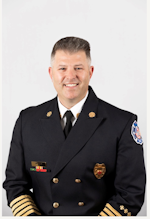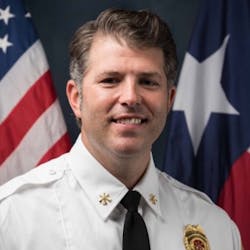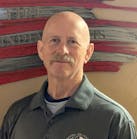“Teamwork makes the dream work” is a familiar phrase, but how do fire service leaders take a dream and make it work? In what areas do leaders in the fire service struggle, and how can those leaders build a winning team to simply “make it happen?”
Teamwork, embracing change and partaking in courageous conversations can combine for a start that can serve as a catalyst for making dreams become reality as we all grow, stretch and grow some more.
It’s all about the team
Babe Ruth shared, “The way a team plays as a whole determines its success. You might have the greatest bunch of individual stars in the world, but if they don’t play together, the club won’t be worth a dime.”
Fire service professionals, as team-oriented people, are at a critical point in the scheme of things, where simple is better and slowing down right now (where possible) and focusing on relationships is key.
The way that a team plays begins with attitude and how each person chooses to play as a teammate. If attitude truly drives performance, then one must reflect on personal attitude and how it affects performance and people. So, everyone should ask themselves: How is my attitude, how is it contributing to my performance and, specifically, how do I perform as a person while at work? Is my attitude detrimental to the team, or does it inspire the team? Do my teammates trust me to do my part?
How we choose to play with others and for whom we play matters. This attitudinal approach can determine a winning or losing team before it ever steps foot on the “field of play.” Talented people quite often will flock to winning teams, because success often is equated to winning, even in the realms of subjectivity.
Fire departments will continue to foster talent when talent chooses to play together. Granted, personal and professional development, vision casting, implementation of new ideas, and constant evaluation of what works and what works well play a strategic and functional role toward success. It is a leader’s responsibility to create a game plan collaboratively, to inspire those contributors to be the best version of themselves within the plan, to communicate the plan, to implement the plan and to identify what needs to change moving forward. If the plan doesn’t work, move onto the next. Either way, the team must move forward as a cohesive unit that comprehends the plan and understands the philosophy of the coach.
Complaining (everyone is guilty of it), tearing down others and making the assumption that only your needs are important are detrimental to the team. Choose joy even in the midst of [fill in the blank], because misery should never love company. “Company” should call out misery, and “company” should hold misery accountable for misery’s actions.
Change is scary—and constant
Socrates was a rather smart guy. He stated, “The secret of change is to focus all of your energy, not on fighting the old, but on building the new.”
His quote—particularly as our job exposes us to destruction daily—should challenge us to reflect on change and on building the new. The past tells a story, but the present capitalizes on change and serves to build the new for the future. You should ask yourself: How does your attitude contribute to the present and the future?
What truly drives change are people who care, work together and consider organization over self. Now this is a vulnerable position, because you might not like what you see when you self-reflect. Vulnerability is having the courage to show up when you can’t control the outcome, which you do every day when the tones drop. So, what is stopping you from that tough talk?
Vulnerability is scary. In fact, vulnerability and fear are “in it” together. So, if you can recognize fear, then you surely can recognize courage and become vulnerable in spite of it. It’s risky, but without risk, you play it safe and lessen the power and effect of courage. Who is better at risk assessments than the fire service? Go forward and rely on courage within vulnerability to affect others and your fire department.
The fire department is a team sport so be the consummate team player. Ask questions as to “why” things happen. Listen and make every attempt to learn a different side, a different story, so you can have a clearer picture of why decisions are made.
At no time do chiefs sit in fire administration and think, “How can I ruin someone’s day or life?” At no time is there intent to cause increased stress in anyone’s life or imply that firefighters are dispensable. When chiefs make decisions, they discuss, ponder, forecast, and, at times, debate and disagree on how they will handle something. Chiefs push back respectfully and have to consider people, places and things, which all have a dollar that’s attached to them.
If something doesn’t make sense to you as a company officer, driver operator and/or firefighter, please ask why the decision was made. It’s the chief’s responsibility to communicate the “why” and to explain the multifaceted process of decisions. Just know that chiefs do consider the effect of decisions and that, at times, the decisions will be unfavorable to members.
Courageous conversations
“Courage is what it takes to stand up and speak; courage is also what it takes to sit down and listen.”—Winston Churchill
I am being courageous in my vulnerability to be real in this article, to challenge you to be courageous and to exemplify vulnerability regardless of the situation.
Officers: Ask questions and then just listen. Ask questions, because there are people who want and need to be heard. The majority of people really just want to know, “What is the plan, how do I fit into the plan, do you hear what I am actually saying, and do you value me?” Don’t we all want this? It’s difficult to have tough talks at times, because there are a lot of emotions attached to conversations. Throw on top of that the fire service, tradition, ranks, egos, etc., and it becomes even more complicated.
As leaders, you must move past arguments and move toward conversations. Nothing gets solved in an argument. Our body is designed to fight or flight, and when a person feels threatened in an argument, progress is challenged, and usually a person resorts to self-defense. If you have increased self-awareness, then some of the conversations might lean toward constructive, instead of destructive, outcomes. If you look inward, your outward delivery could change, where it’s evident that you choose joy in the midst of [fill in the blank], and you become increasingly capable of having tough talks and courageous conversations.
As officers, really as leaders, be the change that you hope to see transpire in your department. Be the officer who you would work for and, more importantly, who you would work with, so your people will feel valued, cared for and heard. This all is key because they are part of the game plan, the winning teammates who do their part. Recognize the value and importance of change by embracing the “new” with the necessary by always considering how you lead on your winning team.

Dr. Brett Ellis
Dr. Brett Ellis is a 27-year veteran of the fire service and serves as the fire chief for the city of Webster Groves, MO. He holds a bachelor’s degree in fire administration from Western Illinois University, a master’s degree in leadership and adolescent development from Huntington University and a doctorate in education from Concordia University-Portland. As a consultant (AGILE Leadership Consulting Inc.), Ellis focuses on leadership, firefighter behavioral health, conflict resolution, officer development, organizational movement, relationship building and personnel role plays that are based on fire service lawsuits. As well, he teaches for the National Fire Academy and Columbia Southern University.






